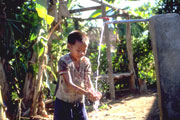Rio+20 Feature: Seven Issues, Seven Experts – Water and Sanitation
World leaders, along with thousands of participants from governments, the private sector, non-governmental organizations (NGOs) and other groups have come together in Rio de Janeiro, Brazil, to take part in the UN Sustainable Development Conference (Rio+20).
In our Seven Issues, Seven Experts series, UN officials tell us more about the key issues being discussed at the conference and how we can contribute to make our planet more sustainable.
In the sixth installment, the UN News Centre spoke with the UN Children’s Fund (UNICEF) Chief of Water, Sanitation, and Hygiene, Sanjay Wijesekera, about the role of water and sanitation and how to ensure sustainable universal access.
UN News Centre: How does water and sanitation fit into sustainable development?
Sanjay Wijesekera: For UNICEF, which is part of the inter-agency coordination mechanism on water and sanitation, known as UN-Water, the issue of climate change and how it impacts on the poorest children is important. Important progress have been achieved in the last 20 years, under-five mortality has come down, but not enough.
The issue of the impact of climate change has the potential to undermine a lot of the progress that has been made. The impact of climate change is largely transmitted through water. This often means either too much water or too little water with huge impact on human development.
Many commitments have been made in past conferences, like Rio 1992 and Johannesburg [the Johannesburg Summit 2002 – the World Summit on Sustainable Development], and Rio+20 presents a unique opportunity to boost commitments from governments to implement these commitments and to hold everyone accountable.
UNICEF’s contribution to the outcome document draws attention to the important disparities in geographic, wealth and gender boundaries in terms of access to safe water and sanitation. The key question is what will do to ensure that the poorest people gain access, and how does a changing environment and climate result in programmatic changes from our side? We are engaging strongly with our partners to address it.
UN News Centre: What can governments do to ensure access to water and sanitation to their populations?
Sanjay Wijesekera: UNICEF is engaged at global and country level to support governments to be able to achieve better results. There are four areas for action.
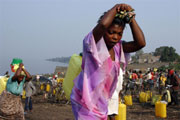
Women carry jerry cans of water at the Plage du Peuple, North Kivu, eastern DR Congo. Photo: IRIN/T. Ridley
First, we must recognise the fundamental importance of water and sanitation to human development, to health, to nutritional status, to education, and, particularly for girls, as well as wider economic development. Water and sanitation is a determinant of much wider human and economic development outcomes – if and when this is recognised, it helps governments focus its policies and resource allocation accordingly.
The second issue, both at a global level as well as within countries, is that there is a misallocation of resources based on where they are needed most. We have done extensive research on where aid money goes and it doesn’t go to the places and the people who need it most. This misalignment must be addressed. That is also reflected in countries’ own allocations, where the poorest and most marginalised people are being left out. We need better information on where the needs are and allocate resources accordingly.
The third area is about models that deliver results at scale. UNICEF works with governments to help them develop models that actually work at scale and not the small pilot projects. We need to deliver services to millions of people effectively and to know that it’s having an impact.
The fourth element is about monitoring results. We need to monitor not only the results but also who is benefitting. We need to measure the impacts on the poorest people. We need to ensure that our programmes are making an impact and, if not, we need to learn in order to improve them.
UN News Centre: Is there a specific goal for Rio+20 regarding water and sanitation?
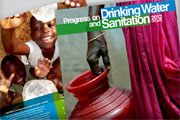
The world has met the MDG target of halving the proportion of people without access to safe drinking water. Photo: UNICEF-WHO
Sanjay Wijesekera: In March, UNICEF and the World Health Organization (WHO) released a monitoring report against the Millennium Development Goal (MDG) target on water and sanitation. The report shows that substantial progress has been made and, indeed, on drinking water, we have met the MDG target. Nevertheless, this showed that lots of people are being left behind, certain regions of the world, certain countries, certain groups of people. Also, the target itself was to halve the proportion of people without access to safe drinking water, which in itself makes it clear that there is another half who have not yet benefitted. In addition to that, there is the whole area of sanitation which is fundamental for human dignity but also for achieving other targets, such as health and nutrition, and sanitation is still off track.
What we would expect and like from Rio is renewed and revitalised commitments. The issue isn’t about not knowing what to do. It is about continuing to make sure we don’t drop the ball, as it’s far too important. UNICEF is working with WHO to develop and get broad agreement on the next generation of targets beyond 2015. The key principles emerging are the need to move to universal access – so far the targets have sought to reduce the numbers – and we now need universal access building on human rights.
UN News Centre: Can you give an example of a project that is succeeding in ensuring access to water and sanitation to an area that previously lacked these services?
Sanjay Wijesekera: UNICEF works in over a 100 countries with people on the ground, so there are a lot of examples to draw on. Last year, we were able to help seven million people gain access to water and 10 million people access to sanitation as a result of our assistance, and that’s not including what we do in emergencies, where UNICEF leads the UN water and sanitation cluster.
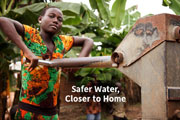
A water system runs through Kominé, part of the Millennium Villages of Tiby in central Mali. Photo: Millennium Promise
A good example would be Mozambique, where we have partnered with the government, and with funding from the Netherlands, we have created the ‘One Million Initiative,’ which seeks to provide water supply and sanitation to one million people and, as of the end of 2011, we were pleased that, ahead of schedule, we had achieved those targets. That is over 1,500 water points and 10-15 small piped water systems. The sanitation part has also been achieved, and it was not based on external parties constructing toilets, but based on people who have constructed them themselves following a process of facilitation. It’s an approach that puts sustainability at the heart of it. Within that programme, we have 214 schools, which represent about 75,000 pupils, that have been provided with safe water supplies.
That programme has a number of innovative elements that we seek to replicate across all our work. One of them is a very strong focus on sustainability to ensure that those services continue to function and provide people with access for a long time to come. A lot of that is building capacity within the government to manage, maintain and operate the systems. Most of the people, 56 per cent, that have worked on the construction [of such systems] are now on the government payroll – that means the government now has the capacity to maintain and expand, which is a very important aspect for UNICEF.
The second important aspect is about impact monitoring. We have independent people that collect data and look at the impact of water supplies and sanitary installations on diarrheal diseases, which are the largest cause of mortality for children under five. They have shown consistently positive results on people’s health.
UN News Centre: How can people contribute to ensuring universal access to water and sanitation?
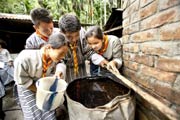
Eliminating places where mosquitoes lay their eggs, such as rain water collection barrels, to protect against malaria. Photo: The Global Fund/J. Rae
Sanjay Wijesekera: There is a lot people can do. The human rights approach is people-centred, regardless on where people are. People within countries that are donors of development aid have to remind their government, especially in these difficult times, of their obligation in helping people to achieve their rights to water and sanitation, education and health, and many things that too many people across the world do not have access to. It is important that organisations that do good work across the world, and not just UNICEF, are well-funded and enabled to continue doing that kind of work.
In poorer countries, governments should be held to account on their responsibilities to allocate their resources according to the needs of the poorest people, but also to adjust their policies so as to enable an environment where results can be achieved on scale, and we’ve seen that that is possible. For example, in Malawi, where about 40-45 per cent of the population has gained access to drinking water since 1995 – it is possible to achieve big results within a relatively short period of time with the right policies, and with monitoring.


